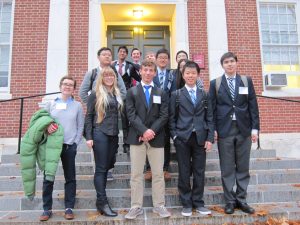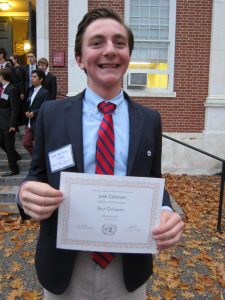12 Model UN members are working hard to prepare for their conference at MIT from February 10-12! Recently, the group learned how to prepare research and write a position paper on their country’s policy. All the submitted position papers were excellent, especially given that all 12 of us are in different committees and studying different topics.
I’ve attached excerpts of some of the most eloquent papers. Note that each excerpt here covers one topic; however, each delegate actually had to prepare research for two very different topics! For instance, Ellie Scott ’18 is in the Disarmanent and International Security Committee, and she learned and wrote about both Conflict Minerals and the Syrian Refugee crisis.
Francois Kaeppelin ’17 wrote about corruption in Asian governments from the perspective of his nation, Vanuatu. I’ve copied that below:
In countries such as Cambodia, Vietnam, and Thailand, corruption has such a penetrating influence that people regularly pay bribes to police officers on arbitrary traffic stops. What these countries have in common is a volatile mix of a lack of transparency and accountability and low wages being paid out to officials and law enforcement. These tend to appear in developing countries where the national policy is focused on strengthening their economy, often ignoring human rights issues. Transparency is hard to achieve in many of these countries due to their authoritarian nature, often silencing journalists and critics. A slow judicial process and inefficient red tape makes it hard for officials and law enforcement to be accountable for their actions, making corruption harder to get rid of. This is worsened by the low wages paid by the respective governments, possibly caused by embezzlement and misdirected funds.
The UNODOC created the Convention against Corruption to prevent and reverse corrupt practices and illicit fund transfers effectively. While it is an ongoing effort – with ratifications in 30 nations – it is just a framework in which countries can cooperate with each other to combat corruption. The same framework can be used to fix corruption in Southeast Asia, especially on issues like transparency and accountability. The European Commission decided to take it one-step further with the Stockholm Program that promotes a more secure and open Europe that benefits the needs and interests of the European people. However, it hardly accomplished anything regarding corruption during its 5 years of implementation (2010-2014) due to its overambitious goals in a short time span. The Stockholm Program did create a regional anti-corruption report every year that could be implemented by ASEAN countries.
Vanuatu passed the Leadership Code Act of 1988 and gave the office of the Ombudsman unprecedented powers protected by its constitution. Vanuatu is a leader in the anti-corruption movement with its ratification of the UN’s Convention against Corruption, their support of government accountability, and their strong belief in rule of law, noted when President Lonsdale refused to pardon 14 MPs on charges of corruption. Unlike many Melanesian countries, Vanuatu places humanitarian issues over political ones, given the devastation of Cyclone Pam in 2014, and hopes for a world in which everyone is treated equally under the law.
Ellie Wolfe ’19 is representing South Korea in a committee about Latin America – a tough assignment by any standard. She discusses Corruption in Brazil below:
Ever since the Brazilian presidential election of 2014, the government and economy has been in an extreme state of turmoil and uncertainty. The Republic of Korea is proud of the steady trade relationship they have maintained with Brazil during this difficult and rocky time, as they have the highest favorability rating to Brazil than any other country in Asia. They do not have an official stance on the crises and scandals that have rocked the Brazilian economy and political sphere. We believe that the Brazilian government must work on their domestic and political problems internally. They will attempt to continue the constant trade relationship they have with Brazil and other countries in Latin America, and hope that the robust trading economy that Brazil was once known for will soon return and help diminish the current state of the national economy.
The Republic of Korea encourages other countries to reveal foreign bank holdings and expose the corruption that plagues the Brazilian economy and government. They also encourage a free and aggressive media, as well as the free flow of people, capital, and goods. There should be less focus on competition between the Latin American countries and more focus on creating a stable, unified continent. No one Latin American country is closed off from the continent-wide economic systems. These nations are inner-connected, with close trade relations and dependence on each other for exports, imports, markets, and capital. The Republic of Korea continues to hope for the Brazilian economy, reform, trade, and restoration of the government.
Finally, I am representing North Korea in a committee about nuclear energy and Small Island Developing States (SIDS). While I’m not usually the self-promoting type, my statement on SIDS is wonderfully sarcastic and blunt, a hallmark of the diplomacy of North Korea.
Small Island Developing States (SIDS) are doomed. The current science, courtesy of the Supreme Leader, suggests that even if emissions are completely cut, sea levels will still rise for a hundred years. By that point, the Maldives will be under water. Truly tragic. The North Korean philosophy of life is juche, or self-reliance. The DPRK notes with sadness that SIDS could not be self-reliant in their time of need. While the DPRK is not in a position to financially contribute to this matter in committee, we suggest a movement towards forward thinking to avoid this problem in the first place. If necessary, the DPRK will even take a few Maldivian refugees. While we generally cap refugees at 10, the Supreme Leader may be willing to increase that cap to a dozen for this unique situation.
Please wish good luck to the delegates listed below as they prepare over the next three weeks for a weekend of fun in Boston! Thanks to Mr. Syfu for his help in all aspects of this project!
Joshua Calianos ’18
Sofia Flores ’18
Alex Foster ’17
Reilly Gluz ’19
Francois Kaeppelin ’17
Sydney Kim ’17
Simon Kim ’19
Sophie Little ’19
Ellie Scott ’18
Vishnu Sekar ’19
Brooke Smith ’19
Ellie Wolfe ’19



